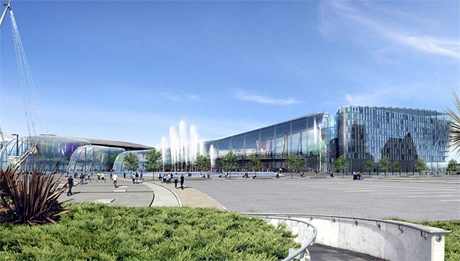
Alexis de Tocqueville’s assessment of the topography of industrialisation seems all the more prophetic as Manchester celebrates another success in its bid to become the centre of ‘trickledown urbanism’. The proposed supercasino presents itself with all the anodyne allure of a suburban leisure centre after a ‘Trinny and Susannah’ makeover – it surely will not be long into the design process before its aesthetic masochism surrenders to the command of the trash of signage and fastfood outlets which will be its inevitable accompaniment. Look out for the KFC bargain buckets speared on the B-of-the-Bang! But of course these joyous prospects are only superficial matters in comparison to the decision to use the local impoverished population as fodder in an experiment into optimising the connection between revenue-harvesting and gambling addiction.
There used to be a general idea that urban regeneration was a benign attempt to address social ills, but that mission would appear no longer to provide the prevailing paradigm. The private miseries of gambling addiction will remain difficult to see, but the tawdry spectacle of Las Vegas-style weddings in the ‘Little Chapel of the Mancunian Miracle’ and the inevitable body-count of the turf war between rival gangs will become obvious, even to the deluded city-fathers with their parochial desire for pseudo-sophistication. For a scholarly reading of the American origins of this political strategy see Still Learning from Las Vegas: The New Face of Urban Redevelopment in a Scavenger Economy Robert Goodman Perspecta, Vol. 29, 1998 (1998), pp. 86-96 Jstor Link (registration required).
